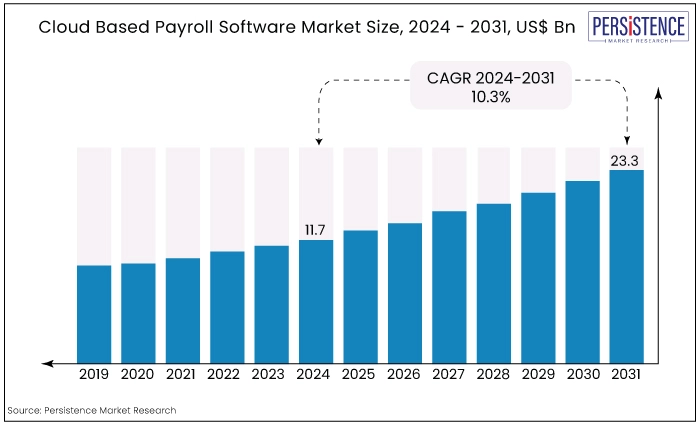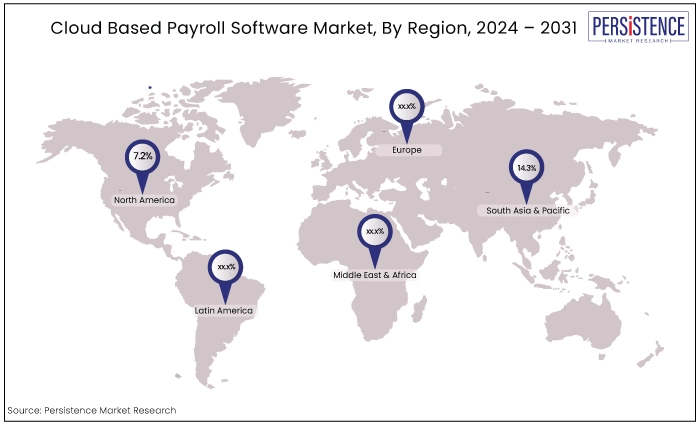Cloud Based Payroll Software Market
Industry: IT and Telecommunication
Published Date: July-2024
Format: PPT*, PDF, EXCEL
Delivery Timelines: Contact Sales
Number of Pages: 208
Report ID: PMRREP34654
The global cloud based payroll software market is estimated to value at US$23.3 Bn by the end of 2031 from US$11.7 Bn recorded in 2024. The market is expected to secure a CAGR of 8.8% in the forthcoming years from 2024 to 2031.
Key Highlights of the Market
|
Market Attributes |
Key Insights |
|
Cloud Based Payroll Software Market Size (2024E) |
US$11.7 Bn |
|
Projected Market Value (2031F) |
US$23.3 Bn |
|
Forecast Growth Rate (CAGR 2024 to 2031) |
10.3% |
|
Historical Growth Rate (CAGR 2018 to 2023) |
8.5% |
Until recently, many small businesses hesitated to adopt new software due to the high initial setup costs. Only large enterprises could realistically consider implementing software to optimize their operations. However, advancements in cloud technology have made business software affordable and accessible for businesses of all sizes.
Cloud-based payroll software is a digital solution for managing and processing employee payroll that operates on cloud technology. Unlike traditional payroll systems that are installed and run on local servers or computers, cloud-based payroll software is hosted on remote servers and accessed via the internet.
Embracing cloud-based payroll software frees businesses from the complexities and expense of purchasing, maintaining, and upgrading legacy on-premises systems.
AI can potentially classify employees to ensure accurate tax bracket assignments and automatically update payroll records in response to changing regulations. This minimizes the need for manual intervention and significantly reduces the risk of compliance issues.
Growing integration like this is revolutionizing how businesses handle payroll and HR functions by enhancing efficiency, accuracy, and the user experience.
Businesses adopting these technologies will likely experience significant improvements in their payroll processes, leading to greater efficiency, cost savings, and employee satisfaction.
Cloud based payroll software has emerged as a transformative force, reshaping how organizations manage their payroll processes. It is characterized by dynamic market trends that reflects the changing requirements of organizations in the digital age.

As cloud technology became more reliable and secure, businesses of all sizes began to shift from on-premises solutions to cloud-based software, seeking the benefits of scalability, cost efficiency, and remote accessibility.
The growing need for automating payroll processes to reduce errors, save time, and ensure compliance with tax regulations and labor laws has fueled the market. Small and medium-sized enterprises (SMEs) have sought cloud-based solutions to streamline their operations without significant upfront investments.
The COVID-19 pandemic accelerated the adoption of cloud-based solutions, including payroll software, as companies transitioned to remote work and needed systems that could be accessed from anywhere.
The ability of cloud-based payroll software to integrate with other HR and financial systems has made it an attractive option for businesses looking to create a seamless and efficient workflow.
Growing Need for a Cost-Effective HR Payroll Systems
Unlike traditional on-premises systems, cloud-based payroll software typically operates on a subscription basis, eliminating the need for large upfront capital expenditures for hardware and software licenses.
Cloud-based solutions reduce the need for ongoing maintenance and IT support, as updates and troubleshooting are managed by the software provider.
Businesses can scale their payroll system up or down based on their needs without significant cost implications, making it an economical option for companies of all sizes.
Automation of payroll tasks such as salary calculations, tax deductions, and direct deposits reduces the time and effort required to manage payroll, leading to increased efficiency.
Automation tends to minimize the risk of human error in payroll processing, which can result in cost savings by avoiding penalties and corrections. The growing need for a cost-effective HR payroll system is a significant driver for the cloud-based payroll software market.
The benefits of lower costs, increased efficiency, enhanced accessibility, seamless integration, and robust compliance features make cloud-based solutions an attractive option for businesses of all sizes.
Integration of HR Technology
Integrating robust HR technology with cloud-based payroll software can significantly enhance the efficiency and effectiveness of a firm’s payroll and HR management processes.
This integration offers numerous benefits, including streamlined operations, accurate payroll calculations, improved data management, and insightful reporting.
Integrating HR technology with cloud-based payroll software provides a unified dashboard where managers and HR departments can access all essential employee data in one place. This centralization simplifies data management and reduces administrative burdens.
With integrated systems, data flows seamlessly between HR and payroll functions, eliminating the need for manual data entry and reducing the risk of errors.
Integrated HR and payroll systems can maintain comprehensive employee profiles, including personal information, job roles, compensation details, benefits, and performance records.
Changes in employee status, such as promotions, terminations, or salary adjustments, are automatically reflected in the payroll system, ensuring that payroll calculations are always up to date.
Integration of HR technology with cloud-based payroll software thus offers a powerful combination that enhances data management, ensures accurate payroll processing, and improves overall HR efficiency.
Data Security Issues
Although cloud-based payroll software offers numerous advantages, data security remains a primary concern for organizations, posing a significant challenge to market growth.
These systems rely on third-party providers to process and store sensitive payroll information, including employees' names, addresses, bank account details, social security numbers, and salary information.
Cloud-based systems can be targets for cyber-attacks, including hacking, phishing, and malware, which can lead to data breaches and the theft of sensitive information.
Payroll data is particularly attractive to cybercriminals due to the comprehensive personal and financial information it contains, increasing the risk of targeted attacks. Due to these security issues, the adoption of cloud-based payroll software may be significantly impacted, thereby restraining its market growth.
Multi-Cloud, Scalable, and Open APIs
The next-generation payroll software must be equipped with essential features to meet the evolving needs of businesses. It should be multi-cloud capable, highly scalable, built on open container technology to enable flexible function migration, and offer easily understandable APIs and public interfaces for seamless integration with partners.
Ramco has already embraced this direction by incorporating these advanced features into their payroll systems.
Given the critical role of effective payroll management in driving a business's success in 2023 and beyond, it is prudent to opt for an advanced, feature-rich, future-proof, employee-enabled, and comprehensive payroll solution.
Such a solution ensures compliance, enhances employee satisfaction, and boosts overall productivity, positioning your business for growth and success.
The adoption of next-generation payroll software, with features like multi-cloud capability, scalability, open container technology, and intuitive APIs, is essential for meeting the evolving needs of modern businesses.
Such advancements not only drive the growth of the cloud-based payroll software market but also position businesses for long-term success by ensuring compliance, enhancing employee satisfaction, and boosting productivity.
Increasing Demand from the Gig Economy
Technology enables people to work from anywhere, and this has given rise to a steadily growing number of freelancers and gig workers. This economic shift from traditional and full-time employment to a mixture of third-party workers has made the situation complex.
Old, legacy systems are not sufficiently well-equipped to handle a diverse and dynamic workforce.
Payroll software makes it easy to efficiently handle and manage the perfect blend of full-time employees and gig workers. Payroll software can help to effectively manage these temporary workers.
Moreover, if it is integrated with the project management software, it can further keep the track of the work progress and issue payments on time upon completion of the project.
The increasing demand from the gig economy is significantly impacting the cloud-based payroll software market. As businesses transition to managing a mix of full-time employees and gig workers, cloud-based payroll solutions offer the flexibility, scalability, and automation needed to efficiently handle diverse and dynamic workforces.
|
Category |
Projected CAGR through 2031 |
|
Solution – Software |
9.2% |
|
End Use Industry – BFSI |
13.4% |
The Software Segment Accounts for the Lion’s Share
In a recent survey of senior finance executives by CFO Research, nearly 41 percent of respondents said their management teams cannot access the data they need when they need it.
Nearly two-thirds said their information systems are duplicative and complex and that the financial and performance information used for decision-making is not as useful as it should be. The biggest factor here is that most businesses are using redundant systems with technology that's many years out of date.
Cloud payroll software delivers information, insights, and consolidated payroll metrics in real-time, without the need for separate business intelligence systems, separate data warehouses.
From getting a view on consolidated payroll expenses to overall tax-liabilities, the information is available in a single click. Cloud payroll software offers numerous advantages over traditional systems like spreadsheets or on-premises payroll software.
With the future of getting back to work uncertain, many companies would benefit from considering remote work as an option for their employees, including remote payroll management.
Market Outlook Looks Most Promising in BFSI
The BFSI industry is anticipated to have the highest share during the forecast period. The BFSI sector is subject to stringent regulatory requirements and compliance standards, including data protection and reporting regulations.
Cloud-based payroll systems offer advanced compliance features and regular updates to adhere to these regulations. While data security is a concern across all industries, BFSI companies prioritize robust security measures due to the sensitive nature of financial information.
Cloud providers offer high-level security protocols, including encryption and secure access controls, which are crucial for the BFSI sector.
The BFSI sector benefits from advanced payroll features such as real-time data processing, automated compliance reporting, and integration with other financial systems which cloud-based solutions provide.
The BFSI sector stands out for its high adoption of cloud-based payroll software due to its stringent regulatory requirements, need for robust data security, and the benefits offered by cloud solutions in terms of scalability, flexibility, and cost efficiency.
|
Region |
CAGR through 2031 |
|
North America |
7.2% |
|
South Asia & Pacific |
14.3% |
North America’s Adoption of Cloud Based Payroll Software Maximum
North America is the most significant shareholder in the global market and is expected to grow at a CAGR of 7.2% during the forecast period. North America, especially the US and Canada, has a well-established and advanced technological infrastructure.
This facilitates the widespread adoption of cloud-based solutions, including payroll software. Many of the leading cloud-based payroll software providers, such as ADP, Paychex, and Workday, are headquartered in North America. Their presence and market leadership drive the adoption of cloud solutions in the region.
North American businesses prioritize operational efficiency and cost-effectiveness. Cloud-based payroll software offers automation, streamlined processes, and reduced administrative burdens, aligning with the region's focus on improving business operations.
North America’s significant share in the cloud-based payroll software market is driven by its advanced technological infrastructure, high demand for efficiency and automation, strong regulatory environment, and early adoption of cloud technology.
South Asia & Pacific Expect a Strong CAGR Through 2031
The South Asia & Pacific Market is projected to secure a CAGR of 14.3% in the forecast period from 2024 to 2031.
South Asia and the Pacific include several rapidly growing economies, such as India, China, and ASEAN countries, which are experiencing significant economic development.
The economic growth is driving the demand for advanced business solutions, including cloud-based payroll software.
As businesses expand and new companies emerge in these regions, there is a growing need for efficient and scalable payroll management solutions.
Cloud technology adoption is increasing in South Asia and the Pacific due to its cost-effectiveness, scalability, and flexibility. As businesses in these regions recognize the benefits of cloud solutions, cloud-based payroll software is gaining traction.
Improvements in IT infrastructure and internet connectivity are facilitating the adoption of cloud-based solutions.
South Asia and the Pacific are set to exhibit a notable CAGR in the cloud-based payroll software market due to rapid economic growth, rising cloud technology adoption, an expanding workforce, technological advancements, and improved business processes.

Companies looking to grow in the cloud payroll software market typically employ a range of strategies to capture market share, enhance their offerings, and meet the evolving needs of businesses.
Companies are incorporating artificial intelligence and machine learning to automate payroll processes, improve accuracy, and provide predictive analytics. They are collaborating with channel partners, resellers, and consultants to increase market penetration and reach new customer segments.
The companies are focused on providing robust customer support services, including 24/7 availability and multi-channel support options. By focusing on advanced technology, global reach, customer support, compliance, and continuous improvement, these companies aim to enhance their offerings, capture new market opportunities, and maintain a competitive edge in the evolving payroll software landscape.
March 2024
Alight, Inc. announced partnership with SAP by integrating SAP S/4HANA Cloud into the Alight Worklife platform. This upgrade aims to boost payroll efficiency, performance, and data security. The new cloud-based system integrates with Human Capital Management (HCM) systems, offering a unified view of the workforce and simplifying payroll and HR management. Additionally, it provides the scalability needed for businesses to grow and expand internationally
January 2024
IRIS Software Group (IRIS) launched Every Payroll By IRIS, a user-friendly cloud payroll solution tailored to simplify the complex payroll processes in the education sector, including pay scales, salary structures, and pension filings. Every Payroll is specifically designed to meet the unique requirements of educational institutions.
March 2024
Oracle announced plans to launch Oracle Payroll for Ireland, a component of Oracle Fusion Cloud Human Capital Management (HCM). Building on the strengths of Oracle’s global payroll solution, this new localization would offer advanced features such as AI-driven risk mitigation, automated workflows, built-in compliance support, enhanced data insights, and accelerated payroll processes for employees in Ireland.
|
Attributes |
Details |
|
Forecast Period |
2024 to 2031 |
|
Historical Data Available for |
2018 to 2023 |
|
Market Analysis |
US$ Billion for Value |
|
Key Regions Covered |
|
|
Key Market Segments Covered |
|
|
Key Companies Profiled in the Report |
|
|
Report Coverage |
|
|
Customization & Pricing |
Available upon request |
By Solution
By Organization Size
By End-Use Industry
By Region
To know more about delivery timeline for this report Contact Sales

The demand for cloud-based payroll software is surging due to a combination of technological advancements, changing business needs, and evolving workforce dynamics.
In the cloud-based payroll software market, the end-use industry exhibiting the most significant share is typically BFSI (Banking, Financial Services, and Insurance).
The integration of Artificial Intelligence (AI) and Machine Learning (ML) into payroll system offers opportunity for the market to grow.
North America is expected to account for the significant share of the market.